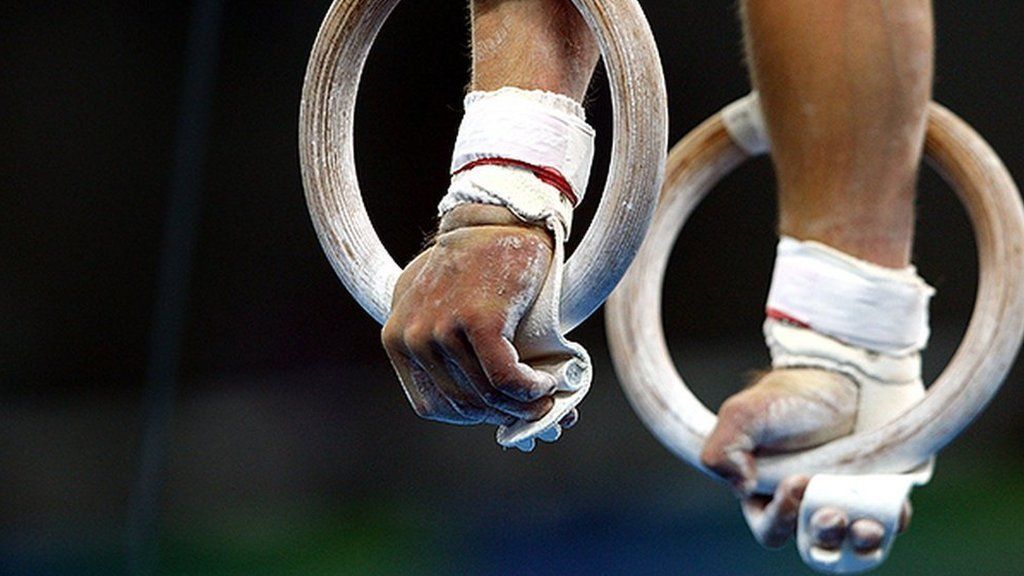British Gymnastics bans coaches from weighing gymnasts in new safeguarding rules after damning review
- Published

Safeguarding concerns in gymnastics have been under the spotlight following the Whyte Review
Coaches will no longer be able to weigh gymnasts under new British Gymnastics rules designed to stop "harmful practices" which it says are "on the fringes of abuse".
The 2022 Whyte Review found "systemic" physical and emotional abuse in the sport "borne of inadequate practice".
This included athletes having their bags searched for food in the "tyranny" of weight management.
"Weighing was used as a punishment," former gymnast Eloise Jotischky said.
"In the past, because there were no policies relating to excessive and inappropriate weight management, often coaches were able to kind of exploit that and would use very harmful practice," Jotischky told BBC Sport.
In June 2022, Jotischky became the first - and to date only - gymnast to win a civil case against British Gymnastics for the abuse she experienced from coach Andrew Griffiths, with British Gymnastics admitting full liability and issuing an apology.
She alleges that between 2016 and 2018, she was left "physically exhausted" after being subjected to inappropriate weight management techniques by Griffiths, who is no longer permitted to coach.
"I think it's a big step," Jotischky said of the new policies. "It's massive to have something in concrete."
Under the new rules - which are now policies instead of guidelines, meaning gyms have to adhere to them or face sanctions - no gymnasts aged 10 or under can be weighed. Those above that threshold can only be weighed with the consent of both the gymnast and their parent or guardian, if aged under 18.
The safeguarding rules also say only sports science or medical practitioners are allowed to do the weighing, with "scientifically valid rationale" being the reason for it.
That means weighing must only be undertaken to monitor whether an athlete is undergoing a growth spurt, for example, or to work out the optimum strength and conditioning exercises for their body.
The policy has been introduced "to prevent inappropriate practices and prevent potential areas of concern around weighing, due to some of the related psychological distress and risks of the development of mental health problems such as eating disorders/disordered eating, anxiety, and depression", British Gymnastics says.
"Inappropriate or excessive weighing of gymnasts is an example of poor practice which may be on the fringe of abuse, and if/or repeated could amount to abuse," it added.
'No desire to put medals above welfare'
'This isn't tough coaching and slight mistreatment' - reaction to the Whyte Review
The Whyte Review, co-commissioned by UK Sport and Sport England, focused on the period from August 2008 to August 2020 and received more than 400 submissions.
Of those submissions, more than 40% described physically abusive behaviour towards gymnasts by coaches, including physical chastisement, inappropriate training on injury, overstretching to the point of distress, as well as withholding food, water and access to the toilet.
Alongside the weighing rules, a new hydration policy says it is "physical abuse" to restrict a gymnast from drinking water or going to the toilet while in training.
It stresses gymnasts should be able and encouraged to taken on fluids regularly, while visits to the toilet should be allowed "at the earliest available opportunity".
"This is about making sure that within gymnastics, we actually don't see them as gymnasts, we see them as young people, we see them as children," said British Gymnastics chief executive Sarah Powell.
"There is no desire for us to put medals above welfare," she added.
In addition, a new academic education policy says no child under 12 can now be taken out of school to train, and those over 12 can only miss school in "exceptional circumstances".
Previous interventions by British Gymnastics on areas of safeguarding have not been mandatory, which now means clubs who fail to comply could face sanctions.
"We've been really clear with this moving from guidelines to policy," said Powell.
"It's really important that we're clear that their performance in gymnastics is not reliant on them missing school."
The policy does not impact competitions, where gymnasts remain permitted to be taken out of school.
In June, campaign group Gymnasts for Change criticised British Gymnastics for not implementing enough changes a year on from the initial Whyte Review findings. To date, only one of the 38 civil cases brought against the governing body has been settled.
The organisation was among those critical of the governing body when a public list of banned coaches was published in September, which review author Whyte suggested "doesn't go far enough".
British Gymnastics is working through a case load of around 350 'concerns' from gymnasts, many of which date back years. The governing body says it is continuing to strengthen the complaints process and to improve communication and support for those involved.